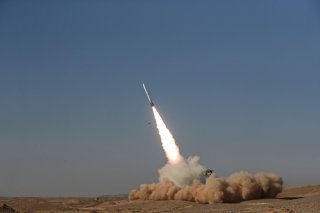Great Way to Start a War: Does Iran Have Anti-Satellite Missiles?
Striking a target just across a national border is relatively easy. What is much harder, however, is striking an adversary’s satellites. Could Iran do it?
Here's What You Need to Remember: Converting a missile from ground attack to space attack is not necessarily difficult. And space is a ripe target. Satellites are virtually defenseless from strikes by kill vehicles.
After the targeted killing of Iranian General Qassem Soleimani, Iran flexed a bit of its ballistic missile muscle in retaliation, striking several bases in Iraq that housed U.S. troops. Striking a target just across a national border is relatively easy. What is much harder, however, is striking an adversary’s satellites. Could Iran do it?
Bombs Away
A report from CSIS stated that Iran’s “missile forces [are] a potent tool for Iranian power projection and a credible threat to U.S. and partner military forces in the region.”
While referencing Iran’s conventional ballistic missile capabilities, the report fails to mention that Iran’s missile arsenal is fully adequate for reaching satellites of varying orbits.
Converting a missile from ground attack to space attack is not necessarily difficult. And space is a ripe target. Satellites are virtually defenseless from strikes by kill vehicles.
The United States, and virtually the entire world is dependent on satellites for peaceful reasons like communications, for navigating by GPS—and for violent reasons, like guiding precision-guided munition, or snapping photos from nuclear test sites.
One expert on the danger posed by anti-satellite capabilities wrote, “the military applications of ASAT missiles appear fairly obvious. China would seek to use the ASAT missiles to knock out U.S. satellites in order to degrade its C5ISR [Command, Control, Computers, Communications, Cyber, Intelligence, Surveillance and Reconnaissance] capabilities, rendering distributed U.S. military and allied assets unable to communicate or share information.”
If enough satellites were knocked out in a conflict scenario, troops would have to dust of the ole map and compass.
Still, striking a satellite is no walk in the park—and more complicated that just launching a missile into space. Satellites are small, and some travel along their orbits quite fast. Striking satellites has been compared to hitting a bullet with another bullet.
No Mental Limitations
Challenges aside, could Iran knock out the United State’s satellites? A Defense Intelligence Agency report acknowledged Iran’s desire to shape the space battlefield. "Iran recognizes the strategic value of space and counterspace capabilities and will attempt to deny an adversary use of space during a conflict.”
Iran does also have some capabilities, due to the aforementioned ballistic missile arsenal it maintains: “Because of the inherent overlap in technology between ICBMs and SLVs, Iran’s development of larger, more capable SLV boosters remains a concern for a future ICBM capability. Also, these advancements could be applied to developing a basic ground-based ASAT missile, should Iran choose to do so in the future.”
Desire aside, Iran has some practical limitations to deal with: “Tehran states it has developed sophisticated capabilities, including SLVs and communications and remote sensing satellites, but its SLVs are only able to launch microsatellites into LEO [Low Earth Orbit} and have proven unreliable.”
Deny > Control
Iran’s capabilities in space are most effective in denying the space sphere to adversaries, rather than actually controlling it themselves. In 2011, Iran was able to capture an American drone by jamming the drone’s GPS signal and spoofing another GPS signal. This is much easier to do than taking out a satellite.
It is unlikely that Iran would be able to strike satellites from their orbit, though the desire and ballistic missile base is there. There are just cheaper and easier alternatives like GPS jamming and spoofing. If you do lose your GPS signal soon—it probably wasn’t Iran.
Caleb Larson is a Defense Writer with The National Interest. He holds a Master of Public Policy and covers U.S. and Russian security, European defense issues, and German politics and culture.
Image: Reuters.

